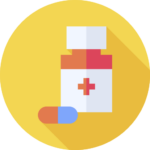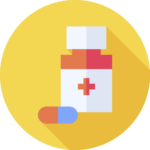Antidepressant drugs serve as crucial medications designed to alleviate symptoms of depression and anxiety by modulating neurotransmitters, the brain’s chemical messengers, to restore balance and enhance mood. They form a vital component of a comprehensive mental health treatment plan, providing relief to individuals grappling with the challenges of depressive disorders.
Exploring the Best Antidepressants: Tailoring Treatment for Individuals
The quest for the best antidepressant is not a one-size-fits-all endeavor. Different individuals respond differently to various medications, and the efficacy of an antidepressant hinges on factors like the type and severity of the depressive disorder, individual physiology, and potential side effects. Here are some commonly prescribed antidepressants, each with its unique characteristics:
- Selective Serotonin Reuptake Inhibitors (SSRIs): SSRIs, such as fluoxetine (Prozac) and sertraline (Zoloft), are often considered first-line treatments for depression. They augment serotonin levels, a neurotransmitter associated with mood regulation.
- Serotonin-Norepinephrine Reuptake Inhibitors (SNRIs): Targeting both serotonin and norepinephrine, SNRIs like venlafaxine (Effexor) and duloxetine (Cymbalta) provide a dual mechanism for mood improvement.
- Tricyclic Antidepressants (TCAs): Older antidepressants like amitriptyline and nortriptyline, TCAs influence serotonin and norepinephrine levels and are typically prescribed when other medications prove ineffective or intolerable.
- Monoamine Oxidase Inhibitors (MAOIs): Phenelzine and tranylcypromine are less commonly prescribed due to dietary restrictions and side effects. They work by inhibiting the enzyme that breaks down neurotransmitters.
- Atypical Antidepressants: Including medications like bupropion (Wellbutrin) and mirtazapine (Remeron), these have unique mechanisms of action and are prescribed when other antidepressants are not suitable.
Antidepressant Medications for Sleep: Finding Tranquility Amidst Turmoil
Quality sleep is crucial for mental health, and certain antidepressants are known for their sedative effects, aiding individuals struggling with both depression and sleep disturbances. Medications like trazodone and amitriptyline are sometimes prescribed to promote better sleep and alleviate insomnia associated with depression.
The Quest for the Best Antidepressant: Individualized Treatment
Identifying the best antidepressant involves a collaborative effort between individuals and healthcare providers. Factors such as side effects, potential drug interactions, and the specific symptoms being targeted are carefully considered. Open communication with healthcare providers ensures that the chosen antidepressant aligns with unique needs and preferences.
Buy Atarax: A Potential Player in Mental Health Support
In the realm of antidepressants, Atarax stands out with its multifaceted role. Though commonly known for its antihistamine properties and anxiety management, its sedative effects may contribute to its potential as an antidepressant for sleep. While not a traditional antidepressant, Atarax’s calming effects may benefit individuals dealing with anxiety-related sleep disturbances.
Before purchasing Atarax, consulting with a healthcare professional is advisable to determine its appropriateness based on individual health and specific mental health needs. The decision to buy Atarax should be part of a comprehensive treatment plan guided by a qualified healthcare provider.
Conclusion: Navigating the Path to Emotional Wellness
Antidepressant drugs play a pivotal role in the journey towards emotional wellness, offering relief to those grappling with the challenges of depression and anxiety. The quest for the best antidepressant involves collaboration between individuals and healthcare providers, ensuring a tailored approach to treatment. As we explore the potential benefits of medications like Atarax, it’s essential to approach mental health with a holistic perspective, incorporating medication as one aspect of a comprehensive strategy that may include therapy, lifestyle changes, and support networks.












